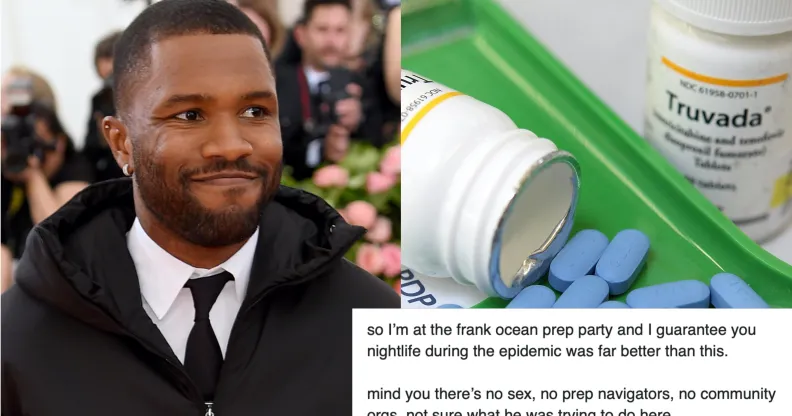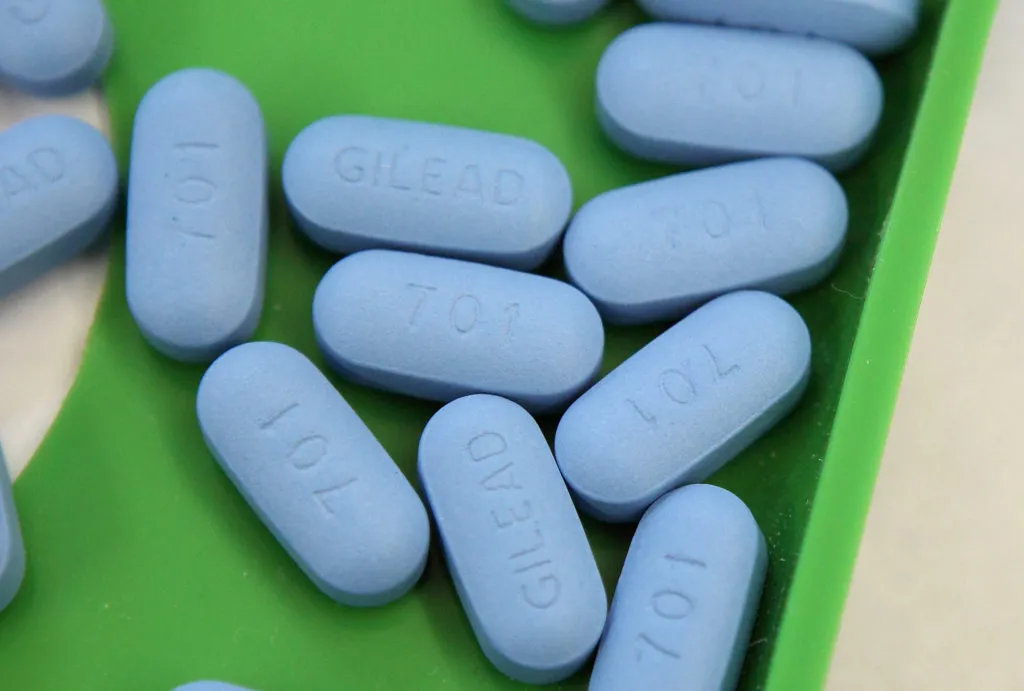Frank Ocean reacts to growing backlash that his PrEP-inspired club night was all just a ‘PR stunt’

After hosting a PrEP-inspired club party, Frank Ocean is caught in a storm of accusations that it was all just a “PR stunt”. (Jamie McCarthy via Getty Images/Justin Sullivan via Getty Images)
With a tightly exclusive guest-list for a night billed with white DJs, and accompanying t-shirts sold for $60, Frank Ocean is being assailed with criticism from the LGBT+ community for his “PR stunt” of a PrEP-inspired club night.
The event – which came just a few days before the singer dropped a new single, ‘DHL’ – ruffled AIDS activists and those living with HIV for having very little to do about the titular drug.
Many took aim with the PrEP+ party merchandise sold, while one guest reported having his Truvada medication almost confiscated by security.
The party was branded as a tribute to New York City’s 1980s queer club scene – if PrEP had been invented at that time – which Ocean scarified was not funded by Gilead Sciences, the manufacturers of the drug in the US.
‘What it could have been if PrEP had been invented in [the AIDS crisis]’.
Named after the HIV prevention drug, the party was pitched as “an homage to New York’s 80s and 90s club scene, and what it could have been if PrEP had been invented in that era,” according to a press release.

PrEP (Justin Sullivan/Getty)
While discrimination against those living with HIV continues despite leaps in medical technologies. PrEP, known as pre-exposure prophylaxis, being a drug taken daily to protest those at a high risk of acquiring HIV.
It’s sold under the brand name Truvada in the US – one months’ supply of the pill can cost up to $2,000.
Taking place at Knockdown Centre in the middle class Fresh Pond neighbourhood of Queens, Frank enlisted Justice, Sango, and Sherelle to DJ.
The inclusion of Justice – a duo of straight, cisgender white men – as the headline act was a lightning rod for criticism, too.
Bouffant Bouffant, renowned figures from the New Orleans queer dance scene, also spun discs for the opening set. While SXYLK had a slot.
Although, the SXYLK allegedly told Them that Ocean’s team asked him to perform to “represent the NYC queer underground.”
Ocean took to the DJ booth in the early morning and appeared to drop two new tracks as well.
But as the morning light dawned on guests emerging out of the lofty venue, which enforced a no-phones policy, many took to Twitter to admit that the queer-themed party wasn’t really queer at all.
ACT UP activist: ‘The nightlife during the epidemic was far better than this’
After the party was announced, the New York chapter of ACT UP – an international HIV advocacy group – slammed Ocean.
“We love you Frank, but 80’s nightlife was revolutionary because of people living with HIV and their caretakers. Let’s uplift our elders and honour their legacy,” the group tweeted.
While queer singer Olly Alexander voiced that he was “shocked” at the haphazardness of the event’s creative direction; a world without the crisis.
to me it feels wrong to re-imagine 80’s nightlife like this, as if prep would have changed everything. let’s uplift our elders and honor their legacy ! thank you @actupny ?
— olly ✨ (@alexander_olly) October 18, 2019
Partygoers also snuck to their phones during the night to tweet their thoughts. The bulk of criticism was that nightclubs were sanctuaries for LGBT+ people in the 80s, and the party’s revisionist theme missed the mark.
According to tweets, Ocean’s revised queer history book of an 80s with PrEP was one where a tangible connection to HIV prevention was non-existent. Sans the function’s namesake.
The language around Fr*nk Oce*n’s party leaves a weird taste in my mouth. Imagining how ‘cute’ parties would have been if people weren’t dying during a plague is kinda gross and discounts the way nightlife was a refuge for queer people during the AIDS crisis. But go off.— Rose Dommu (@rosedommu) October 18, 2019
The reality is that the queer scenes of the cities in the 80s and 90s were fuelled and energised by those living with HIV and the allies that rallied around them.
ACT UP activist Jason Rosenberg explained how the “nightlife during the epidemic was far better than this.”
“There’s no sex, no prep navigators, no community orgs,” he tweeted.
when I say “far better” I meant it as a response to the idea that PrEP would have “enhanced” nightlife during the epidemic. It does a disservice to PLHIV who created spaces to dance during the dark and difficult times.— Jason Rosenberg (@mynameisjro) October 18, 2019
“Oh yeah, and security was super tight; they took my Truvada bottle out of my backpack, and opened it and I jokingly said ‘that’s my PrEP’ and no laughs were received back.”
The crowd and vibe was ‘white’ and ‘straight’ – guests pile-on the criticism.
Furthermore, an anonymous source alleged that multiple people in line had to confirm the pills they were taking into the club were indeed PrEP:
This one says it all. pic.twitter.com/jifX9sZJtU— Ξvan Ross Katz (@evanrosskatz) October 18, 2019
Moreover, another un-named attendee claimed many of the club-goers had little to no awareness of what the titular PrEP is as well as being “very straight”.
“It was so white,” Sesali Bowen, a former senior entertainment editor for Nylon who swung by the bash said. While party staff-manning videocameras peaking out of the dark, strobe light-lit venue made some guests feel uncomfortable.
“I had a lot of fun dancing with my friends, and the venue was pretty cool but it was missing something,” photographer Myles Loftin said.
“There were a lot of straight people there, and a lot of the DJs were straight and white.
“I just wish that it felt more like a queer New York party.”
‘Everything – even AIDS – is a marketing opportunity’
“People living with HIV in the 80s faced almost certain death, which formed ‘futurity,’ queer theory & NYC culture,” wrote Dr. Steven W Thrasher.
This is a weird flex.
It imagines *universal* access to PrEP at an "exclusive" party?
It imagines the club scene in the 80s MADE BY ppl living with HIV as if…if would have been better without them?
And what good is PrEP access to ppl who were homeless, jobless? https://t.co/GmZJK2XB7N
— Dr. Steven W. Thrasher (@thrasherxy) October 18, 2019
“These things couldn’t have happened without people living with HIV.”
“Everything – even AIDS – is a marketing opportunity”, he said, underscoring that to divorce the vibrancy of the 80s queer nightlife from the AIDS crisis is disrespectful.
Yet Ocean contused to be locked in a torrent of criticism after t-shirts, available in both black and white on the singer’s website, went on sale following the PrEP+ club party.
Twitter was snarled by detractors, as initial confusion over the tees translated into anger. ACT UP commented that the garment’s price tag echoed the steep mark-up of the drug itself.
A $60 tee with “PrEP” on it.
Sounds familiar to a pharmaceutical company that marks up the price of PrEP to over $2,000/month while it costs $6 to make a month supply. This is not it Frank. https://t.co/TEFhi2UO5O— ACT UP New York (@actupny) October 19, 2019
‘It’s kind of a slap in the face for an issue that we’re facing in the community’.
It remains unclear what Ocean intends to do with the profits from the T-shirts, which are sold alongside his music merchandise.
Ocean stressed on his Tumblr that the party was not funded by Gilead Sciences, “let’s just get that out of the way.”
“I started to imagine in an era where so many lives were lost and so much promise was lost forever along with them, what would it have been like if something, anything had existed that in all probability would’ve saved thousands and thousands of lives,” he wrote.
“I’m an artist, it’s core to my job to imagine realities that don’t necessarily exist and it’s a joy to.”
However, people remained unswayed.
“The $60 price point is almost so familiar and exact to the problem that we face with pharmaceutical companies at the moment,” Rosenberg told BuzzFeed News.
“We have prices of drugs that are running over 250 times the production cost, which is the price of a cup of coffee to make.
“It’s kind of a slap in the face for an issue that we’re facing in the community.”

